Keeping tabs on the pandemic, its science, evolution, treatment and prevention, though a sombre business, is a breeze when compared to the utterly miserable news from the East; bombing, death and repeat. The War, just begun, like so many others grinds on.
Healthcare in the Ukraine
The pandemic may be fading from our minds, but it remains important, and far more so in the Ukraine where vaccination rates are less than a paltry 40%. There were about 25,000 new cases a day until the war came along and stopped activities regarded as normal in peacetime such as public health and the ability to provide healthcare. Coupled with that are crowding, chaos and malnutrition, conditions ripe for diseases to spread which will add to the misery of day to day life. Russian disinformation about the pandemic was one early tactic it seems and contributed to the low vaccine uptake. Without immunity, Hong Kong is showing that Omicron can still pack a punch..
So, adding to the horror of war, vulnerable and unlucky people who come across SARS2 are likely to fare badly. War and disease come as a package and the bombing of at least 46 healthcare facilities, and counting. This is not new, Physicians for human rights documented 600 deliberate attacks on 350 medical facilities in Syria, so it can be assumed it is a deliberate military tactic.
With inevitable food and water shortages beginning to bite this the health of those in the Ukraine, will only get worse.
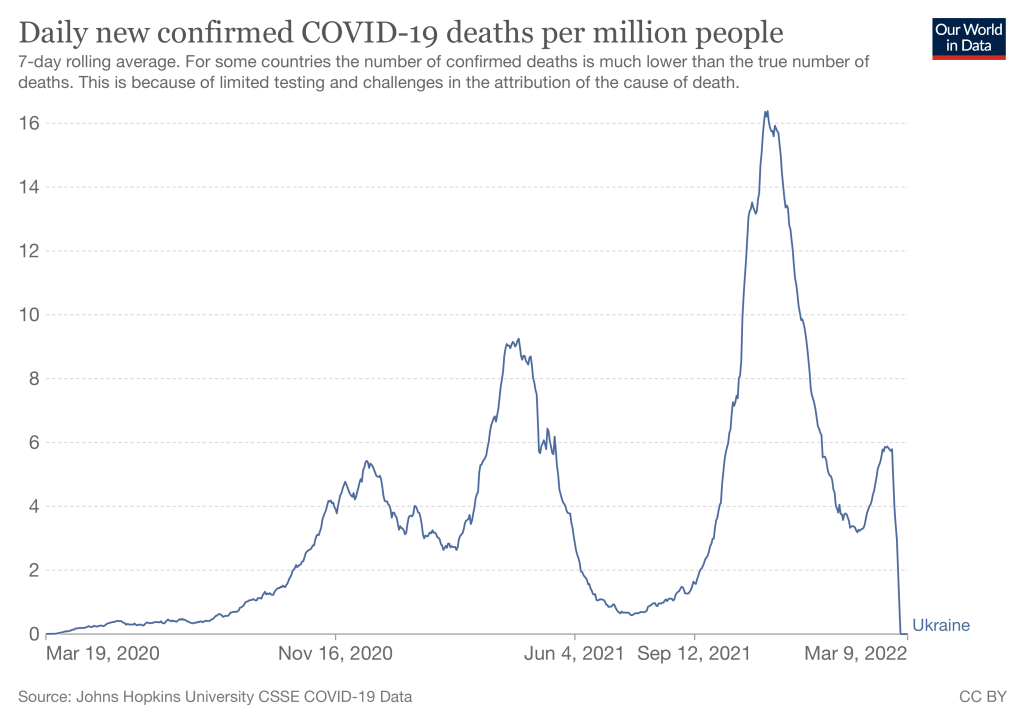
OFF THE RADAR – Deaths from COVID 19 are no longer being counted in the Ukraine, but are certain to be increasing along with war casualties
Care for severe COVID19 will not be available from hospitals reportedly running out of basics like oxygen – the casualties of war will fill up hospitals and their ITU’s literally in a flash. Health care systems are built for peace not war and a weak Ukrainian health system had suffered from corruption and inefficiency for decades. Already high mortality rates for babies and their mothers will now climb for the 80,000 women in Ukraine giving birth in the next few months with more beyond.
An outbreak of Polio, a tragic aside, has also been a recent problem in the Ukraine and catch up vaccinations programmes are an another early victim of war, as will be future children with polio and other preventable diseases.
Women make up 83% of healthcare workers and are risking their lives to provide what help they can, but are tragically absent from the negotiating table, indeed they seems to be absent from any decision making in the region while belligerent men are doing the talking, fighting and bombing.
The increase in COVID cases emanating from the chaos of war will spill over into the surrounding nations as record numbers flee. Research on this is not needed. We know from all wars, most recently in the Yemen where a child dies every 10 minutes from a preventable disease, from the DRC where war compromised the ability to deal with Ebola and in Syria, where measles, amongst others is on the march, along with a nasty disease called “Aleppo Evil” a disfiguring disease spread by sandflies, all the companions of war.
Eyes off the ball
So in the Ukraine any public health measures have taken a distant back seat to multifaceted emergencies of war, here they have been done away with by intent. Saying goodbye to any precautions is another gamble and based on assumptions which I hope prove correct, but the early data shows a subsequent increase in cases and hospitalisations. This will also be due to the B2 Omicron strain which is more infectious still than the B1 original and declining immunity from boosters, some of which will have been given six months ago. Now is not the time to cut pandemic surveillance, but funding for the REACT study and the Zoe symptom tracker, so useful over the last two years is sadly coming to a close.
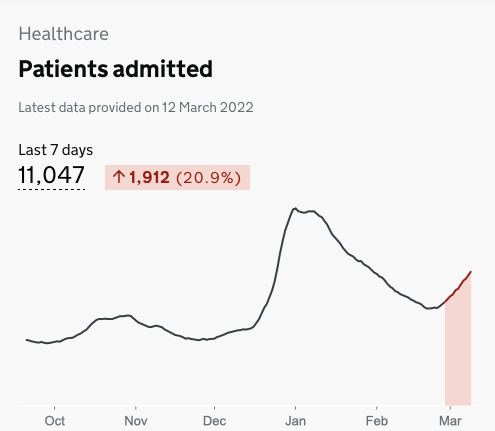
Since doing away with public health measures, UK cases have risen by 50% and hospital admissions (left) by 20%. The spread of the B2 variant will also be playing a part.
Around the world infections rates are generally falling, though with many exceptions (Germany, UK Hong Kong, Iceland and Liechtenstein), so there remains the optimistic view that we are heading out of the pandemic woods. A new variant, including the circulating B3, could change that, but lets for a moment hope that and end is in sight. The Omicron variant causes less illness, and less admissions, in the vaccinated and those not. Yet, the increase in UK cases and hospital admissions shows that living with COVID19 will continue to have costs, including the need for further vaccinations for the vulnerable, now on to their fourth. The pandemic is not over.
Cashing in, and cashing out..
While the pandemic has exposed cronyism and corruption related to healthcare contracts, this pales into insignificance when compared to the global reach of weapons manufacturers. BAE shares are now up 26%, representing a big bloody bonus for shareholders.
Unstable regimes around the around are armed to the teeth with weapons mainly from, er the USA and Russia. The UK were still allowing exports of military goods to RUSSIA as recently as 2021, that is, after the Crimean invasion. Licenses were given for £1.4 million worth of components for military aircraft, helicopters or drones, and £1.2 million of ammunition. Dare I say that it seems highly likely that some wheels were oiled by Russian Tory party donors.
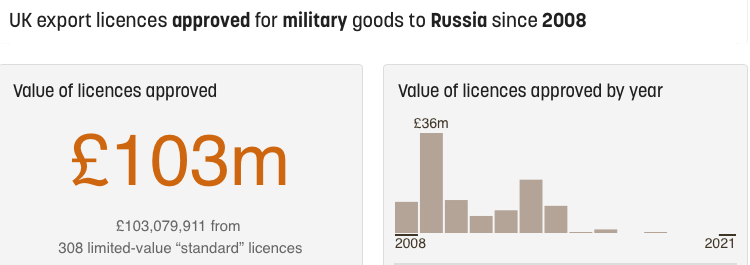
CAAT keep their eyes on arms sales to Russia (left) though these are dwarfed by sales to the Saudis and have contributed to the destruction in Yemen.
Spending by the USA on Ukrainian weaponry is heading for $1 trillion, most predating the invasion. Now sadly, and against their founding principles, the EU are also buying weapons with the bill so far, this early in the conflict, heading towards £275million. The peace dividend is disappearing fast.
There are vast opportunity costs – the price of not investing than money elsewhere. Funds which are critically needed for adaptation to the inevitability of climate change amongst other pressing needs and being spent on weapons of mass destruction, which at their best do nothing, and at their worst create the misery we are seeing in the middle east, Yemen and now in the Ukraine. Profits are up and shareholder payouts are on the way.
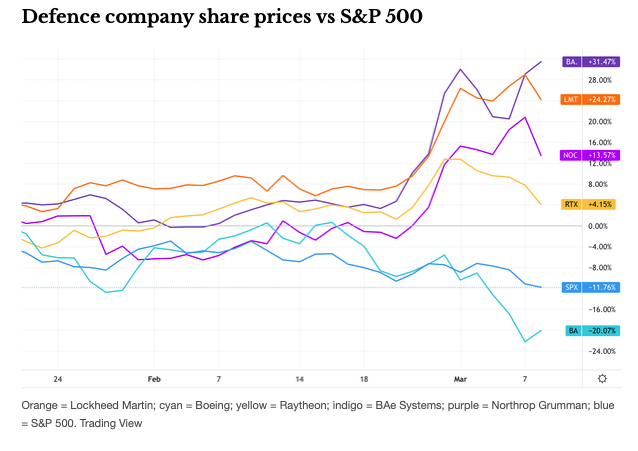
Boeing (bottom) have done badly due to airline losses, other weapons manufactures profiots are on the up.
And what about our own now bombastic, very anti-Putin anti-oligarch Government and the £2million they have accepted from Russians. They are trotting out the excuse that donors have to have UK citizenship, and most of the oligarchs do have dual citizenship, despite that arrangement being a special one for rich “investors” only.

The Conservative party also have to answer for the Russian money which has been rolling in for years and surely should send it, matched by Government as promised, to the DEC’s Ukraine appeal
Refugees.
Our consistently inhumane approach to refugees is also being highlighted by the conflict. Under pressure regarding our inhumanity, Boris Johnsons PMQ answer that this country has taken in more refugees that anyone patent nonsense. That statement only relates to the relatively small number who who applied for refugee status elsewhere and then end up here.

The ultimate Irony being that Johnson now supports Ukrainian entry to the EU which he has spend his political career undermining, belittling and leaving. The war reminds us of the need for unity in Europe and demolishes any case for Brexit. Johnson is no Putin, but we too have a dangerous man in charge
The sad reality is that overall we have taken in far smaller numbers of those fleeing from war, and now, true to form, we are making it difficult for the simplest Ukrainian cases to get here. Conservatives simply don’t like accepting refugees. The Irish and others have simply opened their borders to all refugees, offering stark contrast to our intentional bureaucratic barriers.
We have taken in 1000 refugees and now the government is looking for “sponsorship” to allow refugees in. Those keen to house refugees have to put the name of the refugee to the home office for approval. This means that refugees would have to somehow make themselves knows to those wishing to offer housing – perhaps, and hideously, by advertising on Instagram? This for me smacks of another abrogation of government duty to those fleeing war and will be beset with problems.
My limited experience as a GP with the small numbers of refugees from the Balkans wars revealed how complex are the needs of traumatised people who have lost everything, and who, on present evidence, look unlikely to ever return home. Basing help for refugees on charity rather than our legal and moral obligations echoes the “Food Bank” approach to poverty. There are no easy answers to this, but isolating refugees in homes scattered through the country with little support is not a solution and open to potential abuse.
I still await a reply from my tardy local MP and Council Conservatives. I wonder why?
So while the world abound with experts on war, experts in peace are far and few by comparison, but it is clear that there will be an end to this – what are the possibilities for ending the war?
How is it going to end.
Wars tend to end, and there are a number of very clear options. This is not helped but accusations of war crimes, however accurate that might be, or tyranny or insanity. The hatred I and so many feel towards Putin and his regime must be tempered into a way out. The Russians are aware of the plethora of US and European wars through history, the perpetrators of which can all be called evil war criminals. What matters is ending the war while minimising death and destruction.
Hollow Victories
Zelensky claims victory is possible, as does Putin, but both versions of victory are hollow, associated as they are with incredible amounts of destruction and misery. At the moment stuttering negotiations seem vacuous; red lines crossed everywhere. Russian and Ukrainian men in full macho-mode arguing on Zoom cannot be comfortable and perhaps an international Riga or Yalta style conference is due, even though such agreements seem to end one war but sow the seeds of the next.
Any progress to a Ukrainian victory would mean Russian humiliation with consequences for escalation into tactical or strategic nuclear war, and itself be the product of a long destructive campaign and vast human expense. Barring an improbable coup in Moscow or a new Russian revolution, a Ukrainian victory seems inconceivable.
A Russian victory is less unlikely -see Chechnya. Pulverise the nation into submission and rebuild as a placid Russian ally. This end game too is horrific and military progress is slow – their opponents are better armed. Plus, the Ukraine is 40 times a populous as Chechnya and even there Russia spends about £3billion annually to support the ugly regime there. If the Russians ‘win’ then Ukraine will be a ruin they cannot afford to rebuild, maintain or support.
If arming and encouraging resistance and unprecedented sanctions are there to bring the Russians to the negotiating table, then outcomes other than victory have to be defined. Every sanction applied should surely be accompanied with conditions for their reversal; there has to be a route to ending the war, however uncomfortable.
So a Ukrainian or Russian victory look increasingly unlikely, dangerous and undesirable. A collapse of the Russian regime would be wonderful, but cannot be planned for and is accompanied by its own dangers. Even with military hardware capable of flattening every house and city in the huge country, which seems the preferred tactic to hand to hand urban warfare right now, a way our has to be found, allowing both to claim victory through respective propaganda machinery.
Surrender
How would I feel if I was stopped at the Polish border by Ukrainian soldiers and told to go back to fight the Russians. OK at my age, they would let me though, or I would be drafted to the field hospitals to wield my rusty crafts. Perhaps if younger, I would jump at the chance? Or, would I prefer a surrender to greater forces or proudly fight in the ruins while millions of non-combatants die, flee and suffer disease or starvation. I cannot say.
Surrender, the extreme outcome, would result in less death, even if it led to a Belarus style dictatorship with a yet another Russian sponsored strongman crushing of anything resembling freedom. But is that worse than ongoing destruction of everything that people need to live? Surrender is not on the cards for the Ukraine. While the west continues to pour arms into the area Russian progress will be slow enough to push for compromises, but what might they be?
All leaders could look to the end game and see how all sides could come out of this with their respective propaganda machinery spinning a noble outcome, if such a thing exists. Why wait for more destruction before arriving at a compromise?
Compromise
Zelensky has now taken the positive step of removing NATO membership from constitution; which was surely a big mistake. The long grumbling civil war in the East of Ukraine was never addressed and now compromised will have to be reached.
Putins long essay last year reveals much about his thinking towards the Ukraine, though much of it a view of history which with todays devastation now rings hollow.
A demilitarised democratic Ukraine might seem a million miles away right now, but perhaps therein lies a way out. Addressing the problem of far right militias such as the Azov battalion in the Ukraine should also be on the table. Anywhere else in the world they would be called terrorists. Claims of their cruelty to Russian speakers have some validity and could a part of the talks allowing Putin to claim that the otherwise exaggerated claim of “Denazification” has actually taken place. There is scope for a long ceasefire.
Borders can change. Russia might well add Donbas and Luhansk to the Crimea. After all – the redrawing of borders is not novel in this war torn part of the continent. They might want to advance west across the south Ukrainian coast to effectively land-lock and thus weaken the Ukraine in the long term.
There is history – the pic and text below comes from Wikipedia which describes this moment in Ukrainian history which echoes from the past as well as into our times. There are no good options, but conflicts have to end somehow. Incredibly, there are a few Ukrainians still alive today who have lived through two Russian invasions.
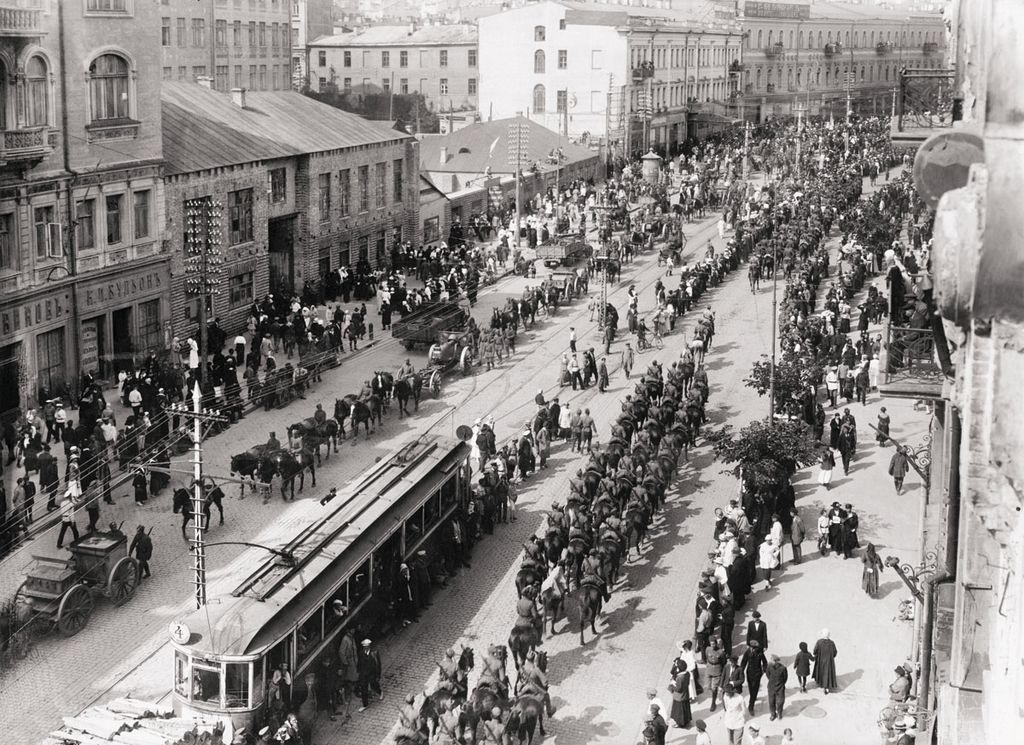
Polish troops enter Kyiv in May 1920 during the Polish–Soviet War in which Ukrainians sided with Poland against the Bolsheviks. Following the Peace of Riga signed on 18 March 1921, Poland took control of modern-day western Ukraine while Soviet forces took control of eastern Ukraine.
So the end game will be a mixture of new borders, a relatively disarmed Ukraine operating outside NATO, a significant development package including from Russia where removal of some sanctions could then happen. It would be peace defined by the absence of war while working towards anything genuinely friendly could take generations. Europe, once again, remains a hot pot of tension with governments in the surrounding nations of Poland, Hungary, Serbia Turkey and others hardly inspiring confidence in their ability to get along and address the needs of the region or world.
Feeling the pain
The war will make all our lives more difficult beyond the heartbreaking daily reports – there are clear implications for us and the way we live. To reduce our dependence of global trade means buying less, driving less, flying less, consuming less energy and eating more carefully. We too are heading for incredible societal changes to adapt to this more dangerous and expensive world. Our elected leaders have to try to pretend that all will be well.
Food – With so many young men off fighting, it seems unlikely that Ukrainian farmers will get wheat and other seeds into the ground this spring. There will follow humanitarian crises in many poor countries who depend on them. In particular, the Ukraine supplies much of Egypt and the Middle East with their staple of grain and global prices will be increasing significantly. They also export most of the worlds sunflower and maize. Bans of Russian wheat exports will be cruelly counter productive. Fertiliser costs are going through the roof – amazingly, most used in the UK are made, you guessed it, in the Ukraine and Russia. This will be seen with further increased in prices on supermarket shelves though the year even if does mean that organic farming gets a boost.
It might also mean an end to biofuels, which in any case are thought to be counterproductive to their aim of reducing CO2 emissions. The land on which they are grown will now be needed for food not fuel. Adjustment of subsidies can change this, but UK farmers are having a terrible time with the post Brexit “Global Britain” allowing in cheap exports to flood in and undermine their already wafer thin profits.
In a globalised world, we are not insulated from this. Growing our own food as a nation will be come ever more important and growing our own food as families and communities will save a packet as well as provide quality food and work. If you can’t grow and of your own food, then buy local if you can but prices will be going up though his year, even without climate driven weather problems. Food banks, that miserable sign of how many fall through our intentionally leaky welfare safety net will be busy!
Energy – Fuel prices are increasing making the cost of transport a real problem for a society addicted to mass transport. Yesterday, a bus trip from Yelverton to Plymouth, I noted, has increased from £4.20 to £5.20, which means that public transport is not the cheap option it should be.
Europe as a whole gets 40% of its gas from Russia and ending this will mean big changes for anyone who enjoys our unprecedented access to energy. OFGEM recently and quietly announced that they have enabled themselves to raise the energy cap before it was due in August and this will cause phenomenal increases in energy costs soon and make an emergency out of the cost of living crisis.
Cost of living – It has been estimated that the sanctions will cost UK households £2,500 a year, with costs as usual hitting the less well of the hardest. Rising costs of living will, this year, make payment of bills impossible for many households and they will need help. If we put the economy on a war footing, it means excess wealth has to end as a price to pay for managing rampant poverty. Tax increases are inevitable though who can pay might have to pay far more. A lot more. Sunak is not keen, still fantasising about a small government, low tax, low public spending economy, those days are gone.
For decades the difference between the amount we export and import have been balanced by the influx of foreign cash, mainly, but not only Russians. It begs the question “Is there such a thing as a good Oligarch?” I think not. Without that we will have to expand our export capability – unlikely given Chinese production costs are 5 times less than ours, or consume far less. In short, we are in big economic trouble.
Staying sane.
The other thing of course, is staying same. For just about the first time in my life, I find it unbearable to watching the daily news. Not out of lack of interest, but because the daily grind of war is the same when viewed from afar; bombs, death, damage – repeat. If the Russians aim is to conquer the Ukraine, this war has only just started. Hope for any resolution, Putins fall, Russian withdrawal, peace talks, international conferences, though inching nearer, all seem way beyond the smoke filled horizon. That could change suddenly, I hope.
Acceptance – There is a culture of wellness in vogue at the moment, and that is a good thing; going beyond avoiding illness to being really healthy and feeling well. When health is lost, acceptance of that loss is a milestone on the way to adaptation. With any semblance of European peace lost, we have to accept that feelings of gloom, depression, worry and fear are all justified, appropriate and have to be lived with, accepted. They are real – don’t worry about being worried.
Sharing helps, being active, keeping busy, doing whatever gives joy; family, friends and all the good things in life, many of which are free and now more important than ever.
Hope – Who knows where this will end? The pandemic had its limits when it comes to suffering, but war stretches the capacity for intentional hardship to infinity. We have to hope that politicians are considering a way to end the horror. For the sake of humanity Putin should be offered a way out of this mess and while things will not be the same till he goes, the war, as usual, demands planning for the post war world.
Right now that is some task. I’m off to the garden!